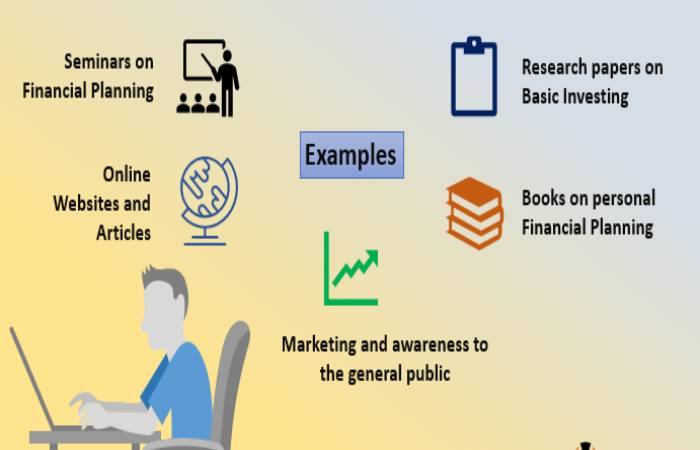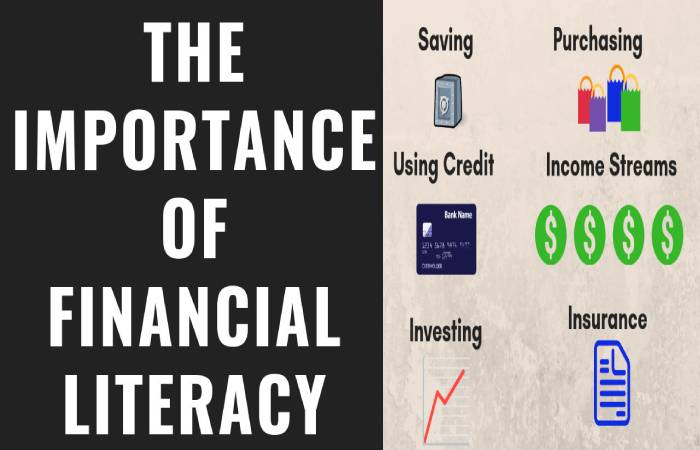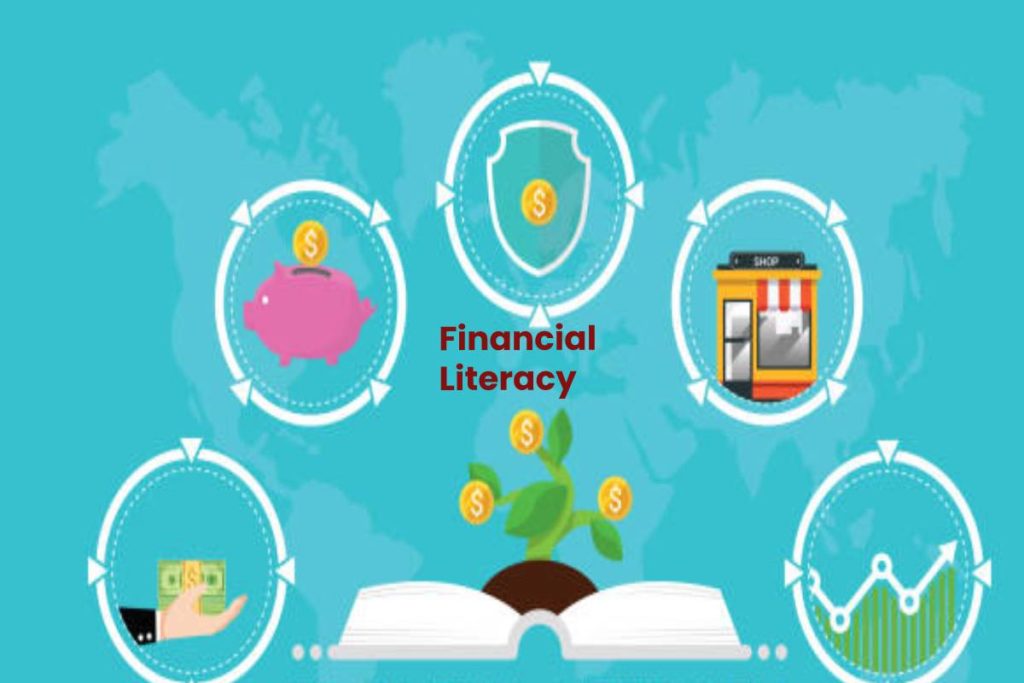Table of Contents
What is Financial Literacy?
Financial literacy is the aptitude to comprehend how to make sound financial selections so you can confidently achieve and grow your money.
When you’re financially literate, you’re able to simultaneously allocate your income toward various goals—not just to ongoing expenses but also to savings, debt repayment, and a rainy day fund. Financial wellness can open doors to investment, charity, and overall improvements in lifestyle.
You can circumnavigate the financial marketplace with self-assurance. And you have the tools to thoroughly investigate things like loans, credit cards, and investment chances.
What Does it Mean to be Financial Literacy?
The Federal Financial Literacy and Education Commission, recognized by Congress in 2003, identified five fundamental principles of financial literacy. Being financially literate, according to the command, means understanding each of these components:
- How much you earn, counting your pay, benefits, and tax withholdings;
- How to save and invest, including making an emergency fund and setting aside money for both short- and long-term goals;
- And also, how to defend your money by buying insurance and knowing how to evade fraud;
- How to apply wisely through budgeting and contrast shopping;
- And also, how to copy money at the lowest possible interest rate and how to keep your credit healthy with responsible repayment habits.
Examples of Financial Literacy

Examples of financial literacy in action are:
- Comparing promotional stages on balance transfer credit cards, so you have an extended period to pay off debt;
- Increasing your retirement savings degree every time you get a raise;
- Checking your credit report frequently for errors;
- These behaviors support you to advocate for yourself in the marketplace and save money in the long term.
Why Is Financial Literacy Important?

Financially literate consumers can achieve money with confidence, which means effectively allocating their earnings to their goals and limiting or attacking their debt. Here are the customs of financial literacy that can affect your life:
1. Understand How to Budget
- To pay for expenses, save or become rid of debt, you must appreciate how much income you’re taking in and distribute it effectively.
- Making a budget is your first stage toward a proper understanding of money management.
- Once you have an account, you can last to track spending and revisit your spending plan regularly.
- There are countless budgeting methods (zero-based, two-account, etc.), so choose the one that you’re most likely to stick to it.
2. Understand and Manage Debt
- When you are financially literate, you know the position of seeking out the lowest interest rates when comparing loan terms.
- You also know that paid off credit card balances each calendar month is your best bet for preventing attention charges and tall credit utilization, which touches your credit score.
- If you already have debt, it can benefit you to choose the best systems to get out of debt, also on your own or with the assistance of financial products such as debt alliance loans or a sense of balance transfer credit cards.
3. Understand How an Emergency Fund Works
- A crucial way to stop debt from the building is to make an emergency fund.
- Savings account that you can attract from when unexpected expenditures arise.
- A financially literate investor knows how abundant to set aside—ideally three to six months’ worth of expenses—and replenishes it when essential.
4. Plan for Retirement
- While emergent an emergency savings account, saving for superannuation should be a concurrent long-term goal.
- When you’ve developed financially literate, you can calculate how much to save and which types of accounts will support you get there.
How to Build Financial Literacy?
- If you’re eager to develop more financially literate, there are several tools you can use on your personal to aid you in understanding and manage money.
- Start with tools obtainable for free from your bank, credit union, or credit card issuer. Your bank’s app or website may benefit you track spending patterns. Several banks also propose free credit score tracking programs.
- You may also reflect using a third-party budgeting app to save track of spending and financial goals.
- A budgeting worksheet like the one providing by the Consumer Financial Protection Bureau (CFPB) is an additional option.
- The CFPB offers numerous consumer tools on various topics, including guides on brand financial choices such as buying a house.
- Local capitals such as your state’s consumer protection agency or attorney general’s office provide support for customers and offer educational programs on financial topics.
- Credit counseling agencies, which employ counselors expert in budgeting and debt reduction techniques, also are useful local options.
- Consider occupied with a financial advisor, such as a certified financial planner, if you have the means.
- They have deep expertise in compound financial goal-setting, and their facilities can include guidance on tax preparation, saving for college and retirement, and paying down debt.
- You can hunt for a certified financial planner in your part or one you can work with remotely, using files like the XY Planning Network or the Garrett Planning Network.
Why is Understanding Credit Important to Your Financial Literacy?
Lenders use your credit score to choose whether to work with you, and landlords may usage your credit score to control whether you qualify for an apartment.
Your credit notch is the backbone of your financial lifetime, and having a good one allows you to meet financial goals like buying or renting a home.
To develop behaviors that reinforce your credit score, acquaint yourself with the factors that contribute to it:
1. Payment History
- Payment history is the most significant contributor to your FICO® Score☉ , the credit score most usually used by lenders, office for 35% of it.
- Pay all bills on time to save this vital part of your credit as healthy as possible.
2. Credit Utilization
- The quantity of credit you use compared to your credit boundary is your credit utilization, which accounts for 30% of your score.
- Experts say means of more than 30% of your obtainable credit can negatively affect your scores.
- Ideally, pay off credit card stabilities each month to save your credit utilization as low as possible.
3. Credit Mix
- The different kinds of credit you use factor into your score, but less significantly than payment past or credit utilization.
- Lenders like to see that you can achieve multiple credit categories, from student loans to credit cards to mortgages.
4. Hard Inquiries
- Having credit is essential, but only apply for the credit you need. That’s because your credit score incorporates the number of credit requests you’ve made.
- Every application reasons a lender to pull your credit report, resulting in a hard inquiry.
- Hard inquiries display up on your credit report, and too many will start to affect your credit score and seem a risk factor to lenders.
5. Negative Information
- Suppose you miss a bill payment, declare bankruptcy, or otherwise demonstrate that you did not manage a credit account as agreed.
- In that case, that info will appear on your credit report for seven years in most cases and up to 10 years for plain infractions.
- Lenders will consider this when deciding whether to approve you for new credit.
- Checkered your credit score, bank accounts, and credit card equilibria regularly to uphold an ongoing image of your finances.
- When you view your credit account, you’ll be able to see whether your credit card balances are too high, for example, or if you’ve wasted a payment and need to course-correct, so you don’t miss anymore.
- Knowing your credit score also helps you control which loans or credit cards you’re likely to qualify for it.
Conclusion
Financial literacy is not a luxury—it’s a need. Understanding money organization will aid you to feel in control of your finances.
Ideally, with strong financial literacy, you’ll be self-assured in money management to the point where you can pay attention to your energy elsewhere: on hobbies, family, friends, and the parts of life that money can’t buy.

